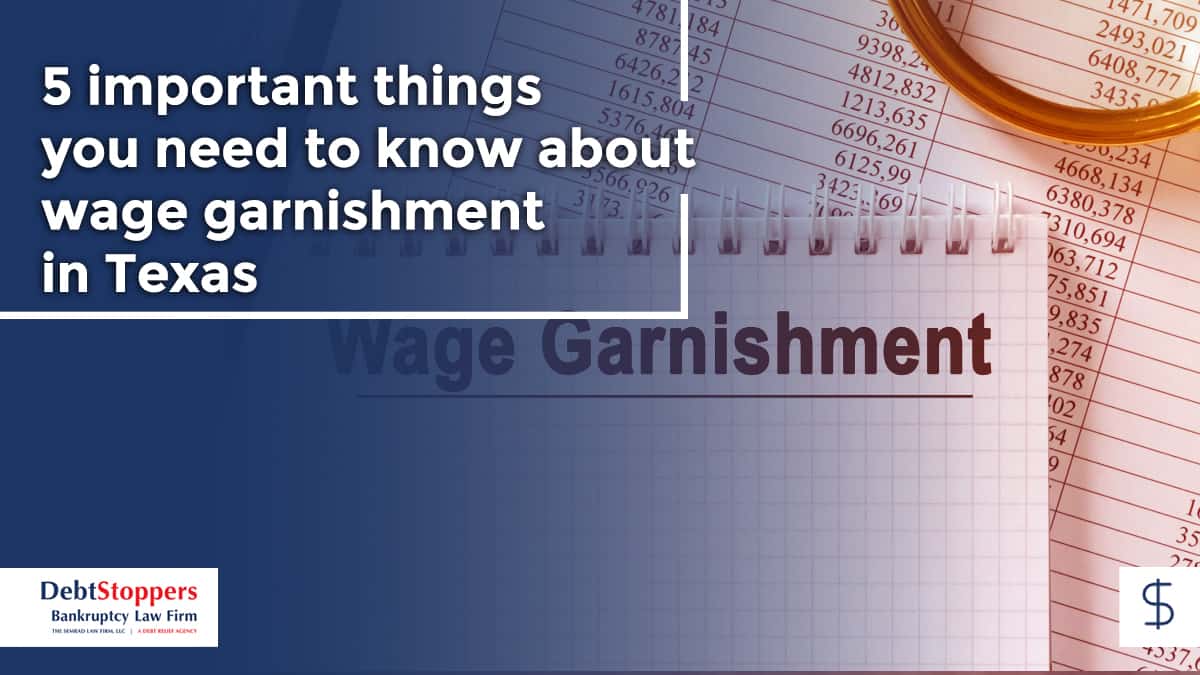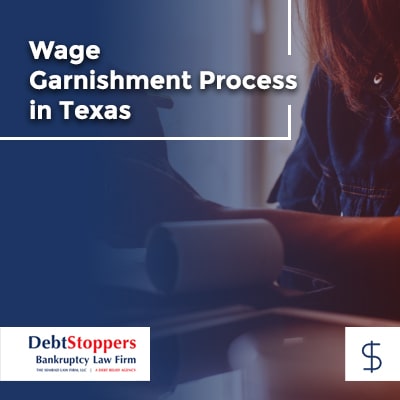5 important things you need to know about wage garnishment in Texas

There are five important things you should know about wage garnishment in Texas:
-
Texas has strong protections for debtors
-
There is limited garnishment for consumer debts
-
There are exceptions for certain debts including unpaid child support, alimony, unpaid taxes, and defaulted federal student loans
-
If a creditor is eligible to garnish wages, they must go through a legal process, typically obtaining a court order and you will receive prior notice before any garnishment occurs
-
Texas has laws that exempt specific property and assets from creditors including homestead protection, personal property, retirement accounts, and other assets up to certain specified values
Understanding these aspects of wage garnishment in Texas can help people facing wage garnishment navigate their rights and protections under the law. It's advisable to seek legal advice and understand the specifics of your situation when facing potential wage garnishment, as laws and exemptions may vary based on individual circumstances and changes in state legislation.
Wage garnishment in Texas
In Texas, wage garnishment laws have some distinct features compared to other states.
Notably, Texas has strong protections for debtors, limiting the types of debts that can lead to wage garnishment. Common consumer debts like credit cards, medical bills, and personal loans typically cannot result in wage garnishment in Texas. However, exceptions include unpaid taxes, child support, alimony, federal student loans, and defaulted federal loans.
If wage garnishment is permitted for a particular debt type, Texas law typically protects a significant portion of an individual's income. For example, for consumer debts like credit cards, Texas law generally protects 100% of wages from garnishment, except for certain types of debts (child support, alimony, and unpaid taxes). These types of debts take precedence over other debts when it comes to wage garnishment. In these cases, the government or the custodial parent may garnish wages without a court order.
Texas has laws protecting certain property from creditors. These exemptions include home equity, personal property, retirement accounts, and other assets up to specific values. These protections help prevent creditors from seizing essential assets to satisfy debts.
It's important to note that while Texas has robust protections for debtors regarding wage garnishment, it's always advisable to consult with a legal professional or a financial advisor to understand the specifics of your situation and the applicable laws, as they can vary based on individual circumstances and changes in state legislation.
Texas Law
It's important to note that Texas law provides substantial protections for debtors, limiting the types of debts that can lead to wage garnishment and safeguarding a significant portion of an individual's income from garnishment. Exceptions exist for certain types of debts like child support, alimony, unpaid taxes, and federal student loans, which can result in wage garnishment without a court order.
Debtors have rights and may be able to challenge the garnishment through legal means, so individuals facing wage garnishment should seek legal advice and understand their rights under Texas law.

Wage Garnishment Process in Texas
The process of wage garnishment in Texas follows specific steps and legal procedures. Here's an overview of the typical process that occurs after a creditor seeking to garnish wages files a lawsuit against the debtor. Creditors often file lawsuits for unpaid debts, such as child support, taxes, defaulted federal loans, or court judgments for specific types of debts.
Personal Judgment Against You
If the creditor wins the lawsuit, the court issues a judgment in favor of the creditor. This judgment outlines the amount owed by the debtor and authorizes the creditor to collect the debt through wage garnishment. With the court judgment in hand, the creditor can then request a garnishment order from the court. This order specifies the amount to be garnished from the debtor's wages and provides instructions to the debtor's employer regarding withholding a portion of the debtor's earnings.
Wage Garnishment Order
Once the garnishment order is obtained, the creditor serves the order to the debtor's employer, instructing them to withhold a certain percentage of the debtor's wages or salary. The employer is legally obligated to comply with the order and withhold the specified amount from the debtor's paycheck. The employer deducts the specified amount from the debtor's wages and sends it directly to the creditor or the entity specified in the garnishment order. This process continues until the debt is satisfied, the court orders otherwise, or the debtor makes other arrangements with the creditor.
The debtor receives notice of the wage garnishment before it begins, providing information about the debt, the amount to be garnished, and options for disputing the debt or negotiating repayment terms.
File for Bankruptcy
If you're facing wage garnishment in Texas and considering bankruptcy as a solution, it's important to understand how bankruptcy might affect the garnishment and your overall financial situation.
Filing for bankruptcy triggers an automatic stay, which immediately halts most collection activities, including wage garnishment. This provides immediate relief from the garnishment process. The type of bankruptcy you file (Chapter 7 or Chapter 13) will impact how wage garnishment is addressed (see below).
It’s important to note that Texas has strong exemptions protecting wages from garnishment for most consumer debts. Even if you don't file for bankruptcy, many creditors cannot garnish wages for debts like credit cards, medical bills, or personal loans.
Chapter 7 Bankruptcy in Texas
If you qualify for Chapter 7, the automatic stay will temporarily stop the wage garnishment. However, certain debts, such as unpaid taxes, child support, and alimony, are typically not discharged in Chapter 7. If these are the reasons for garnishment, the process might resume after bankruptcy.
Who can garnish your wages?
Wage garnishment laws in Texas are some of the most protective in the country. For most types of debt, creditors cannot garnish your wages. However, there are exceptions. Federal and state government agencies can garnish wages for specific debts, such as unpaid taxes, defaulted student loans, or child support. Child support garnishments are particularly strict in Texas, with up to 50% of disposable income eligible for garnishment if you support another dependent and up to 60% if you do not. Additionally, garnishment for federal debts, such as taxes or student loans, overrides the general protections in Texas.
Can collections garnish wages?
No, collection agencies cannot garnish wages in Texas for consumer debt, such as unpaid credit cards or medical bills. Texas law prohibits wage garnishment for these types of debts, providing significant protection for residents. However, creditors can pursue other avenues, such as seizing bank accounts or placing liens on property, to collect unpaid debts. It’s still important to address collection attempts promptly to avoid these actions or to negotiate payment arrangements with the creditor.
Can student loans garnish your wages?
Yes, defaulted federal student loans can result in wage garnishment in Texas, despite the state’s restrictions on wage garnishment for most debts. The federal government can garnish up to 15% of your disposable income through administrative wage garnishment without requiring a court order. Private student loan lenders, however, must sue you and obtain a judgment before pursuing garnishment. To prevent wage garnishment, consider options like loan rehabilitation, consolidation, or entering an income-driven repayment plan.
Can you get garnished for medical bills?
Texas law prohibits wage garnishment for medical bills and other types of consumer debt. However, this doesn’t mean you’re off the hook for unpaid medical expenses. Creditors can use alternative methods to collect, such as filing a lawsuit to obtain a judgment and then placing liens on property or levying bank accounts. If you’re struggling with medical debt, consider negotiating directly with the provider or exploring payment plan options to avoid further legal action.
Can your wages be garnished without notice?
In Texas, creditors generally cannot garnish wages for consumer debts, but garnishment is allowed for specific obligations like child support, taxes, or federal student loans. In these cases, you may not always receive advance notice before garnishment begins. For instance, federal agencies collecting unpaid taxes or defaulted student loans can garnish wages administratively. However, they are typically required to send a notification explaining the garnishment and your rights, including the ability to dispute or request a hearing.
Does wage garnishment stop automatically?
Wage garnishment in Texas stops automatically once the debt is fully repaid or if a bankruptcy filing results in an automatic stay. Garnishment for child support may end when the child reaches adulthood or as specified in the support order. Similarly, garnishment for taxes or federal student loans ends when the obligation is paid in full or if an agreement is reached with the creditor to resolve the debt. Since wage garnishment for consumer debt is not allowed in Texas, creditors may pursue other collection methods that require proactive resolution.

Chapter 13 Bankruptcy in Texas
With Chapter 13, the automatic stay also stops wage garnishment. You'll propose a repayment plan to catch up on missed payments over a 3-5 year period. This plan may include paying off the garnishment arrears over time.
How can Debtstoppers help you with wage garnishment in Texas?
If you are considering filing for bankruptcy in Texas, consulting with an experienced bankruptcy attorney is crucial. The experienced attorneys at Debtstoppers can assess your situation, advise on the best course of action, and guide you through the bankruptcy process, helping you understand your rights and options.
Bankruptcy can provide relief from wage garnishment; however, it's essential to weigh the consequences and implications. Before proceeding, seek professional advice to determine if bankruptcy is the best solution for your specific financial circumstances and to understand the potential long-term effects.





